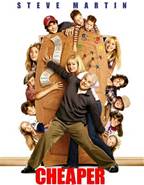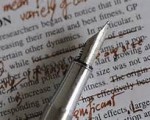 In the Steve Martin movie version of Cheaper by the Dozen, there’s a scene where, two days after Bonnie Hunt (the wife) is told her book will be published, she opens the door and her friend is standing there with the book - already published, with a glossy, sensational cover. Friend breathlessly announces that it has hit the stands with five hundred thousand advance copies and there was a 6-month book signing tour already scheduled, starting the next day! This wasn’t even 6 weeks after it had initially been submitted. I practically rolled on the floor laughing, and the people around me in the theater thought I was nuts.
In the Steve Martin movie version of Cheaper by the Dozen, there’s a scene where, two days after Bonnie Hunt (the wife) is told her book will be published, she opens the door and her friend is standing there with the book - already published, with a glossy, sensational cover. Friend breathlessly announces that it has hit the stands with five hundred thousand advance copies and there was a 6-month book signing tour already scheduled, starting the next day! This wasn’t even 6 weeks after it had initially been submitted. I practically rolled on the floor laughing, and the people around me in the theater thought I was nuts.
Where was the editing? Where was the negotiating of the contract? Where was the slicing, dicing, and ruination of the original work? The proofing? The p romoting? Those of you who have been through the process know what I’m talking about – editing alone would have taken more than 6 weeks. I have friends who have been published by houses and have self-published. In every case, the author is involved in a lot of negotiation-on contract, on content and editing. Word counts are too high or need to be expanded. Facts need to be vetted. It takes time.
romoting? Those of you who have been through the process know what I’m talking about – editing alone would have taken more than 6 weeks. I have friends who have been published by houses and have self-published. In every case, the author is involved in a lot of negotiation-on contract, on content and editing. Word counts are too high or need to be expanded. Facts need to be vetted. It takes time.
Books are still published the old fashioned way, through a dwindling number of large publishing houses. But the houses don’t take a chance on a new author very often, because a Grisham or King book is a sure thing, sales-wise. So the odds are stacked against you. And contrary to what you see in the movies, a writer is expected to do more than just write the words. Fame as an author doesn’t usually come until after you have paid your dues – hitting the road to promote your book, doing publicity, contacting radio and television stations to create interviews – many times on your own dime.
Because of this, self-publishing has gotten easier. With so many P.O.D. and e-publishers these days, if you can download a computer program, you can get your book published. With this comes the great responsibility of being sure your book is actually fit to print. You won’t have the backing of a publishing house, with its stable of editors to help you along. I have had the sad experience, with my new Kindle, of being sucked into that daily deal, only to wade through a perfectly good story that is badly edited. It’s really hard to read through misspellings and bad grammar.
book published. With this comes the great responsibility of being sure your book is actually fit to print. You won’t have the backing of a publishing house, with its stable of editors to help you along. I have had the sad experience, with my new Kindle, of being sucked into that daily deal, only to wade through a perfectly good story that is badly edited. It’s really hard to read through misspellings and bad grammar.
I’m planning on releasing a collection of short stories this summer (you heard it here first!). I want to make sure all the I’s are dotted and the t’s crossed, as well as checking grammar and punctuation. I’ll have friends proofread, and they will be sick of it before it’s done. I want you eager for the next publication, not regretting the purchase.
Have you made a bad e-book purchase? As a reader, what advice would you give?






Get’s you thinking, doesn’t it!? I have never tried to get published because I have always told myself that I was writing for my own pleasure. I think now I was just too scared to tackle the publishing world. You are an inspiration to me Gayle Glass. Keep posting the words we need to hear. Thanks.
I’ll be glad to see your short story collection, Gayle. My next project is to publish my short stories, too,
Counting on it,DJ
Great post! If only things were as simple as in the movies! I’ll be glad to see you published and would help in any way I can.